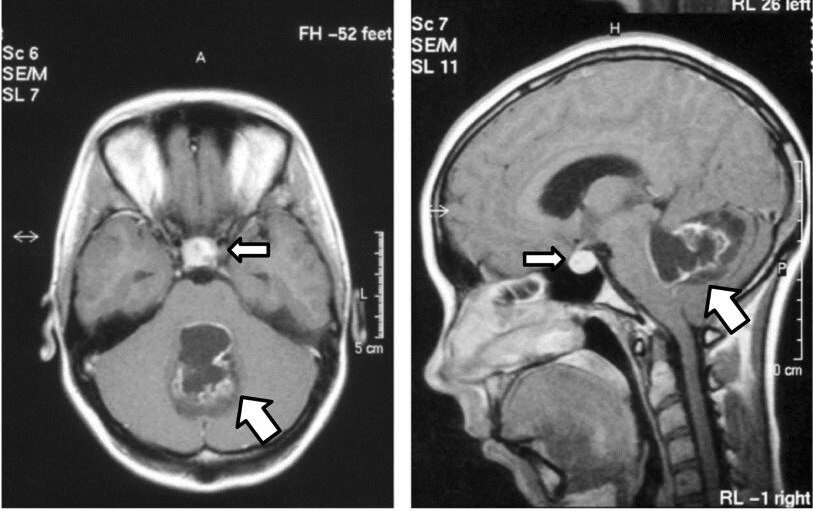Playlist
Show Playlist
Hide Playlist
Hyperprolactinemia
-
Slides 01-02-01 Adrenal Pituitary.pdf
-
Reference List Endocrinology.pdf
-
Reference List Pituitary and Hypothalamic Disorders.pdf
-
Download Lecture Overview
00:01 Physiologically, prolactin induces and regulates lactation. 00:05 Hence, elevated levels of prolactin cause galactorrhea or abnormal lactation. 00:11 Women are more likely to develop galactorrhea than men. 00:15 Hyperprolactinemia also causes hypogonadotropic hypogonadism because of its negative feedback effect on gonadotropin-releasing hormone in the hypothalamus which in turn decreases the levels of LH and FSH. 00:29 Both men and women can present with hypogonadism. 00:32 Unlike other pituitary tumors, medication rather than surgery is first-line therapy for prolactinomas. 00:39 Even patients with severe mass effects such as vision loss are treated with medical therapy initially. 00:45 Rarely, very large tumors or more invasive prolactinomas do not shrink with medical therapy and continue to grow. 00:53 Surgery should be considered followed by radiotherapy if growth occurs or continues. 01:00 After being debulked, the prolactinoma may respond better to medical therapy. 01:05 This table reviews the different causes of hyperprolactinemia. 01:09 Starting with physiologic changes, the most important one is pregnancy, and lactation, as well as nipple stimulation. 01:16 Important medications to consider include antipsychotic agents, metoclopramide, cimetidine, verapamil, methyldopa, opiates, and cocaine. 01:27 Other causes of hyperprolactinemia include prolactinomas, pituitary tumors, hypothyroidism, cirrhosis, and chronic kidney disease. 01:36 Let's take a look at some of these in more detail. 01:39 The most common cause of elevated levels of prolactin are obviously pregnancy, and in the postpartum period, to facilitate lactation. 01:48 Physiologic stress, coitus, and exercise can increase prolactin levels up to 14 nanograms per ml. 01:55 Normal ranges numerical include two to 29 nanograms per ml in non-pregnant women, and two to 18 nanograms per ml in men. 02:06 Nipple piercing can increase prolactin levels above 200 nanograms per ml. 02:13 Antipsychotic agents cause hyperprolactinemia due to their antidopaminergic effect that interrupts the inhibition of prolactin by dopamine. 02:22 Specific agents such as risperidone and metoclopramide may raise the prolactin level above 200 nanograms per ml. 02:29 Evaluate for pituitary hypersecretion when a patient is taking a medication known to raise the prolactin level. 02:36 When the prolactin level is only mildly elevated, less than 50 nanograms per ml, it may be reasonable to assume that hyperprolactinemia is a medication side effect. 02:46 When significantly elevated, above 100 nanograms per ml, either the medication needs to be withheld or further assess a pituitary MRI obtained to evaluate for a prolactinoma. 03:00 Caution is warranted when discontinuation of an antipsychotic agent is being considered, and consultation with the psychiatrist who actually prescribed it is recommended prior to acute discontinuation. 03:12 Another cause of hypoprolactinemia is primary hyperthyroidism. 03:17 Hypothyroidism can cause diffuse swelling of the pituitary gland that may resemble enlargement due to a pituitary adenoma on imaging. 03:26 A patient with primary hypothyroidism and hyperprolactinemia should be treated with thyroid hormone replacement with the retesting of the prolactin level once the TSH has normalized. 03:37 Further evaluation is indicated if the hyperprolactinemia does not correct when hyporthyroidism is treated. 03:45 Clinical features and diagnosis of hyperprolactinemia. 03:48 Symptoms in men are insidious and may go unrecognized for years. 03:53 Both men and women with hyperprolactinemia are likely to be infertile and are at risk for osteoporosis. 04:01 Postmenopausal women are already hypogonadal because of ovarian failure. 04:06 Therefore, hyperprolactinemia may have minimal clinical implications in this group of patients. 04:12 The cause of postmenopausal hyperprolactinemia still requires diagnosis because it may be due to a pituitary tumor that can have effects within the brain.
About the Lecture
The lecture Hyperprolactinemia by Michael Lazarus, MD is from the course Pituitary and Hypothalamic Disorders. It contains the following chapters:
- Hyperprolactinemia
- Medication-induced Hyperprolactinemia
- Hypothyroidism
- Clinical Features
Included Quiz Questions
Excessive levels of prolactin in female patients is most likely to cause which of the following conditions?
- Galactorrhea
- Gynecomastia
- Heavy menstrual bleeding
- Ovulation
- Hirsutism
Which of the following medication classes is most likely to cause hyperprolactinemia?
- Antipsychotics
- Antihypertensives
- Opioid analgesics
- General anesthetics
- Antidepressants
Customer reviews
5,0 of 5 stars
| 5 Stars |
|
5 |
| 4 Stars |
|
0 |
| 3 Stars |
|
0 |
| 2 Stars |
|
0 |
| 1 Star |
|
0 |




